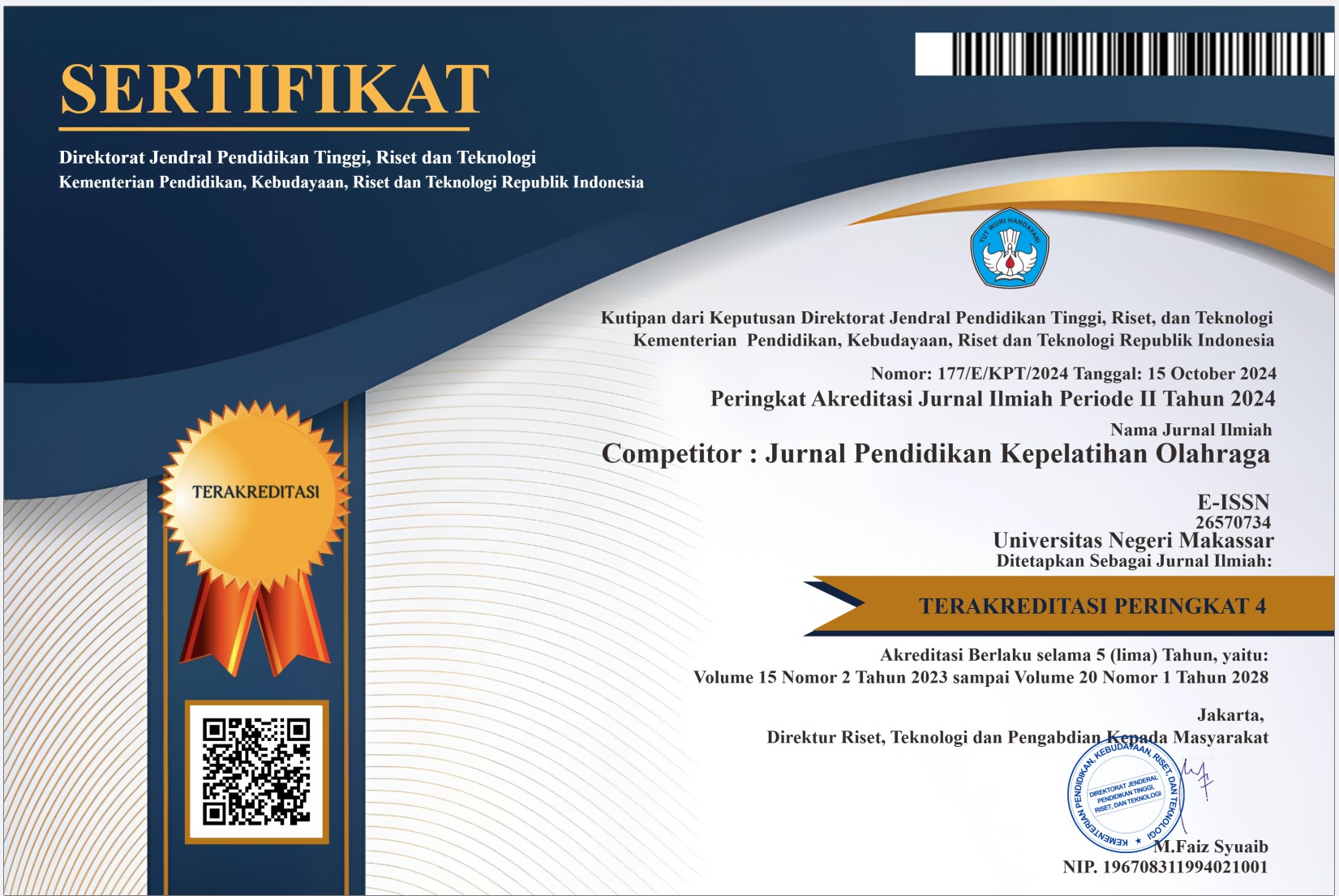Effects of Tabata and Circuit Training on Mood and Sleep Quality During Ramadan in Students
DOI:
https://doi.org/10.26858/cjpko.v17i1.73592Keywords:
Tabata, Circuit, Mood States, Sleep QualityAbstract
Ramadan fasting can affect mental and physical health due to changes in eating patterns and sleep patterns. This study aims to compare the Tabata training method with Circuit Training on sleep quality and mood disorders in students during Ramadan fasting. This study involved 30 male students who were randomly divided into Tabata training groups (n = 15) and Circuit training (n = 15). In Tabata training, participants did 8 rounds with 6 repetitions, while in Circuit training, participants did 6 rounds with 6 repetitions. After training, participants will fill out the Profile of Mood States (POMS) questionnaire which aims to measure mood after training and at dawn participants will fill out the Sleep Quality Scale (SQS) questionnaire for sleep quality. The results showed that Tabata training can improve sleep quality and reduce mood disorders, especially in terms of fatigue, tension, and depression compared to circuit training. These findings also show that higher intensity training such as Tabata has a good impact on sleep quality and mood during fasting. This study also explores the important role of exercise intensity and time in managing the challenges of fasting and provides insights into the use of tailored fitness programs during the fasting period.References
Ambroży, T., Rydzik, Ł., Obmiński, Z., Błach, W., Serafin, N., Błach, B., Jaszczur-Nowicki, J., & Ozimek, M. (2021). The Effect of High-Intensity Interval Training Periods on Morning Serum Testosterone and Cortisol Levels and Physical Fitness in Men Aged 35–40 Years. Journal of Clinical Medicine, 10(10), 2143. https://doi.org/10.3390/jcm10102143
Bonato, M., La Torre, A., Saresella, M., Marventano, I., Merati, G., Banfi, G., & Vitale, J. A. (2020). Effect of High-Intensity Interval Training Versus Small-Sided Games Training on Sleep and Salivary Cortisol Level. International Journal of Sports Physiology and Performance, 15(9), 1237–1244. https://doi.org/10.1123/ijspp.2019-0498
Boukhris, O., Trabelsi, K., Shephard, R. J., Hsouna, H., Abdessalem, R., Chtourou, L., Ammar, A., Bragazzi, N. L., & Chtourou, H. (2019). Sleep Patterns, Alertness, Dietary Intake, Muscle Soreness, Fatigue, and Mental Stress Recorded before, during and after Ramadan Observance. Sports, 7(5), 118. https://doi.org/10.3390/sports7050118
El-Jaziz, A., & Lotfi, S. (2023). Chronotype, Aerobic Performance, and Sleep Quality of Young Athletes Before and During Ramadan Observance. Sleep Medicine Research, 14(2), 98–104. https://doi.org/10.17241/smr.2023.01739
Elsahoryi, N. A., Ibrahim, M. O., Alhaj, O. A., Abu Doleh, G., & Aljahdali, A. A. (2025). Impact of Ramadan Fasting on Mental Health, Body Composition, Physical Activity, and Sleep Outcomes Among University Students. Healthcare (Basel, Switzerland), 13(6). https://doi.org/10.3390/healthcare13060639
Evans, M., Rohan, K. J., Howard, A., Ho, S.-Y., Dubbert, P. M., & Stetson, B. A. (2017). Exercise Dimensions and Psychological Well-Being: A Community-Based Exercise Study. Journal of Clinical Sport Psychology, 11(2), 107–125. https://doi.org/10.1123/jcsp.2017-0027
Foster, C., Farland, C. V, Guidotti, F., Harbin, M., Roberts, B., Schuette, J., Tuuri, A., Doberstein, S. T., & Porcari, J. P. (2015). The Effects of High Intensity Interval Training vs Steady State Training on Aerobic and Anaerobic Capacity. Journal of Sports Science & Medicine, 14(4), 747–755. http://www.ncbi.nlm.nih.gov/pubmed/26664271
Frimpong, E., Mograss, M., Zvionow, T., & Dang-Vu, T. T. (2021). The effects of evening high-intensity exercise on sleep in healthy adults: A systematic review and meta-analysis. Sleep Medicine Reviews, 60, 101535. https://doi.org/10.1016/j.smrv.2021.101535
Grove, J. R., & Prapavessis, H. (1992). Preliminary Evidence for the Reliability and Validity of an Abbreviated Profile of Mood States. International Journal of Sport Psychology, 23(2), 93–109.
Hosseini, E., Ammar, A., Josephson, J. K., Gibson, D. L., Askari, G., Bragazzi, N. L., Trabelsi, K., Schöllhorn, W. I., & Mokhtari, Z. (2024). Fasting diets: what are the impacts on eating behaviors, sleep, mood, and well-being? Frontiers in Nutrition, 10. https://doi.org/10.3389/fnut.2023.1256101
Kawinchotpaisan, K., Segsarnviriya, C., & Norchai, P. (2025). The Effects of High-Intensity Interval Training (HIIT) on Sleep Quality in Obese Patients: A Systematic Review and Meta-Analysis of Randomized Controlled Trials. Obesities, 5(2), 32. https://doi.org/10.3390/obesities5020032
Kim, J.-W., Ko, Y.-C., Seo, T.-B., & Kim, Y.-P. (2018). Effect of circuit training on body composition, physical fitness, and metabolic syndrome risk factors in obese female college students. Journal of Exercise Rehabilitation, 14(3), 460–465. https://doi.org/10.12965/jer.1836194.097
Kv, S., Kumar, S., & Tk, J. (2024). A Tabata-based high-intensity interval training study on body composition and physical fitness in sedentary university female students. Journal of Human Sport and Exercise, 19(4), 1072–1083. https://doi.org/10.55860/pd1fbx66
Lahouel, W., Bouzid, M. A., Hadj Kacem, F., Hammouda, O., Rebai, H., Frikha, H., Abid, M., Mnif, M., & Tagougui, S. (2024). Ramadan-Induced Lifestyle Changes: Effects on Sleep and Physical Activity in Nonfasting Individuals With Type 1 Diabetes. Canadian Journal of Diabetes, 48(8), 531–538. https://doi.org/10.1016/j.jcjd.2024.09.146
Martínez-Díaz, I. C., & Carrasco, L. (2021). Neurophysiological Stress Response and Mood Changes Induced by High-Intensity Interval Training: A Pilot Study. International Journal of Environmental Research and Public Health, 18(14), 7320. https://doi.org/10.3390/ijerph18147320
Min, L., Wang, D., You, Y., Fu, Y., & Ma, X. (2021). Effects of High-Intensity Interval Training on Sleep: A Systematic Review and Meta-Analysis. International Journal of Environmental Research and Public Health, 18(20), 10973. https://doi.org/10.3390/ijerph182010973
Scott, A. J., Webb, T. L., Martyn-St James, M., Rowse, G., & Weich, S. (2021). Improving sleep quality leads to better mental health: A meta-analysis of randomised controlled trials. Sleep Medicine Reviews, 60, 101556. https://doi.org/10.1016/j.smrv.2021.101556
Talisa Emberts, John Porcari, Scott Dobers-tein, Jeff Steffen, & Carl Foster. (2013). Exercise Intensity and Energy Expenditure of a Tabata Workout Dear Editor-in-Chief. July, 612–613. http://www.jssm.org
Xie, W., Lu, D., Liu, S., Li, J., & Li, R. (2024). The optimal exercise intervention for sleep quality in adults: A systematic review and network meta-analysis. Preventive Medicine, 183, 107955. https://doi.org/10.1016/j.ypmed.2024.107955
YI, H., SHIN, K., & SHIN, C. (2006). Development of the Sleep Quality Scale. Journal of Sleep Research, 15(3), 309–316. https://doi.org/10.1111/j.1365-2869.2006.00544.x
Zouhal, H., Saeidi, A., Salhi, A., Li, H., Essop, M. F., Laher, I., Rhibi, F., Amani-Shalamzari, S., & Ben Abderrahman, A. (2020). Exercise Training and Fasting: Current Insights. Open Access Journal of Sports Medicine, Volume 11, 1–28. https://doi.org/10.2147/OAJSM.S224919
Downloads
Published
Issue
Section
License
Copyright (c) 2025 Choirul Umam, Anung Priambodo (Author)

This work is licensed under a Creative Commons Attribution 4.0 International License.



















